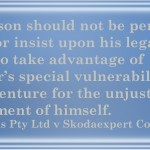Don’t Make Promises in Business You Can’t Keep
The court may decide you must uphold your promises even though you don’t believe you have entered into a contract or legal agreement. Promissory Estoppel is one of the elements of contract law that must be considered when drafting or entering into a contract or agreement.
Promissory Estoppel
![Broken egg shells - broken promises. You can't break a promise in a legal agreement]()
A promise must normally be in a deed (legal agreement or contract) or supported by consideration to be enforced. The principle of estoppel however may allow a promise to be enforced even though these requirements are not satisfied.
The development of the concept of “promissory estoppel” in contract law has led to the proposition that a court may decide that a “contract” has come into being even though the traditional rules for contract formation have not been satisfied.
The 5 elements of Promissory Estoppel are:
1. Some form of legal relationship either exists or is anticipated between the parties.
A contractual relationship is the most common type of “legal” relationship. Parties to pre-contractual negotiations also fall within this principle.
2. A representation or promise by one party.
Traditionally, estoppel could only be used with respect to a representation about an existing fact. The High Court decision in Waltons Stores (Interstate) Ltd v Maher (1988) 164 CLR 387, however, extended the doctrine to representations about future conduct. This type of “promissory estoppel” arises where the promise is given in circumstances that lead the other party to assume the promise will be performed.
3. Reliance by the other party on the promise or representation.
The party relying on the promise must suffer a detriment
4. Detriment
The party relying on the promise must have suffered some sort of detriment. In other words, the party must be in a worse position for having relied on the promise.
5. Unconscionability
There is no general restriction, which prohibits a person from breaking his or her promise. Accordingly, before an action for estoppel will succeed, it must be shown that, in the circumstances, it would be unfair or inequitable to allow them to do so.
Remedies
![Quote from Olex Focas Pty Ltd v Skodaexpert Co Ltd 1997]() The remedies available to someone who has relied on a promise to their detriment are equitable. This means that the court has a discretion in deciding what to do and it will do what it can to relieve the detriment suffered. The courts will not necessarily force the party to honor its promise, unless this is the only way to do justice.
The remedies available to someone who has relied on a promise to their detriment are equitable. This means that the court has a discretion in deciding what to do and it will do what it can to relieve the detriment suffered. The courts will not necessarily force the party to honor its promise, unless this is the only way to do justice.
When and How to Use Estoppel
A party seeking to raise estoppel must make out a clear case and show that it would be unconscionable for the promisor to go back on their promise. Unconscionability is really the backbone of estoppel.
It is important to realise that failing to fulfil a promise does not of itself amount to unconscionable conduct, nor does mere reliance on a promise to a person’s detriment. Something more is really needed such as encouragement by the party that the promise will actually be performed.
The principles outlined above should always be the starting point if estoppel is to be used. The nature of estoppel, however, is such that it cannot be defined into simple elements. At best, the principles are a guide as to what the court will look for.
Related
General Commercial Agreements
Your Quick Guide To Contracts







